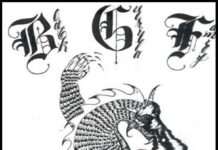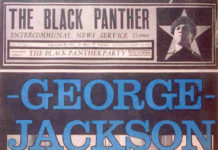by David L. Hudson Jr.

Michael Hawkins received the copy of “Blood in My Eye” from his mother in 2003 when he was incarcerated at Lancaster State Prison. Jackson completed the book, detailing his political theories and ideologies, days before he was killed at San Quentin prison in 1971 during an alleged escape attempt.
Lancaster prison officials allowed Hawkins to keep the book. When he was transferred to Donovan State Prison, he was also allowed to keep it. In December 2006, officials transferred Hawkins to Folsom State Prison, where, he said, the book was not initially confiscated.
However, in August 2007, a guard searched Hawkins’ cell and found evidence that he thought showed Hawkins might be affiliated with the Black Guerilla Family. The guard found a book with a Swahili word written on it, and became suspicious because BGF members sometimes adopt Swahili names.
Searching further, the guard confiscated four items: 1) a document titled “So That We Don’t Fool Ourselves — Again: Study Notes on Secure Communication”; 2) an article titled “History is a Weapon! Black August Resistance,” by Watani Tyehimba; 3) an article from Prison Focus newspaper, which included a picture of George Jackson; and 4) the photocopy of “Blood in My Eye.”
Prison officials used these items in determining whether they could validate that Hawkins was affiliated with or a member of the BGF. Hawkins asserted that he was not a gang member but a model inmate with no disciplinary history.
Prison officials initially contended that George L. Jackson literature was banned in the prison. However, in March 2011, a federal district court found no such institutional ban. The court denied the officials’ motion for summary judgment, noting also that “Folsom had not imposed a formal ban on Blood in My Eye” in August 2007. The court indicated that prison officials could renew their motion for summary judgment if they could produce evidence that they properly confiscated the item for other legitimate security concerns.
Prison officials filed another motion for summary judgment in July 2011, contending that they confiscated “Blood in My Eye” because they had other evidence that Hawkins might be affiliated with the BGF. Hawkins countered that “he is not, nor has he ever been an associate or member of the BGF prison gang.” He wrote that he was simply an “avid reader with an interest in Black history.”
U.S. District Judge for the Eastern District of California Carolyn K. Delaney granted summary judgment to the prison officials in her March 26 opinion in Hawkins v. Russell. Finding that the prison officials acted out of legitimate security concerns, she relied on the U.S. Supreme Court decision in Turner v. Safley (1987), in which the Court created a prison-deferential standard requiring that officials have a reasonable and legitimate penological purpose for their speech-restrictive actions.
Delaney reasoned that prison officials were acting out of legitimate security concerns because several of Hawkins’ possessions showed an interest in George L. Jackson and the Black Guerilla Family gang.
“Even if plaintiff did nothing more than possess multiple items that, in total, suggested a keen interest in Jackson and the BGF, this was enough to implicate legitimate security concerns,” she concluded.
Delaney also rejected Hawkins’ due-process and equal-protection claims.
The decision presents a classic example of how deferential the Turner v. Safley standard is in operation. Hawkins possessed the same book at other prisons and had no disciplinary record. But the court sanctioned the censorship of a widely read work on the basis of scant – if any – evidence of possible wrongdoing by the prisoner-litigant.
People read books for many reasons. I have read George L. Jackson’s other book, “Soledad Brother.” That doesn’t mean I’m a member of the BGF, support the BGF or in any way identify with the BGF. A prisoner could identify with another prisoner who wrote books for many reasons, including an interest in Black history, not because he or she wishes to start a revolution or join a gang.
Hawkins v. Russell is another in a long line of rulings that unnecessarily restrict prisoners’ First Amendment rights.
David L. Hudson Jr., a scholar at the First Amendment Center, is the author or co-author of more than 30 books, including several on the U.S. Supreme Court, the Constitution and student rights. His latest book is “Let the Students Speak!: A History of the Fight for Free Expression in American Schools” (2011). He can be reached at davidpress@freedomforum.org.

 Store
Store












